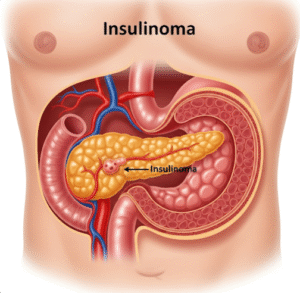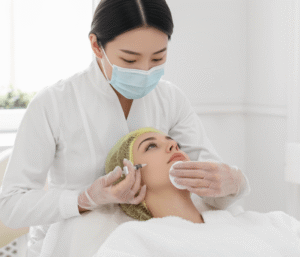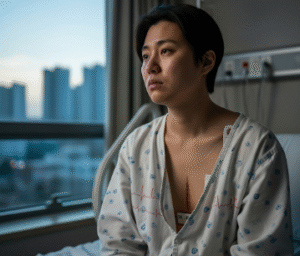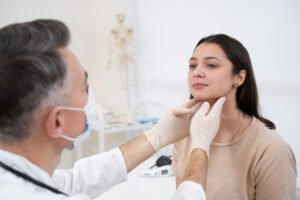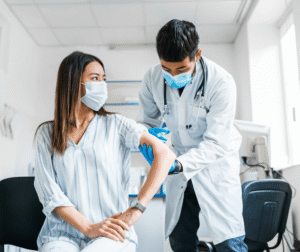What it is
Ovarian cancer screening refers to the use of medical tests to detect ovarian cancer at an early stage, ideally before symptoms appear. Ovarian cancer is often called a “silent killer” because early stages typically present with vague or no symptoms, and most cases are diagnosed at an advanced stage.
In Korea, ovarian cancer screening is offered in women’s health clinics, cancer centers, and specialized hospitals, using a combination of imaging, blood tests, and genetic testing. Although no single test is universally effective for early detection, screening programs in Korea aim to identify high-risk women and catch potential cancer cases as early as possible.
➡️ Key methods of ovarian cancer screening:
- Transvaginal ultrasound (TVUS): Visualizes ovaries for abnormalities
- CA-125 blood test: Measures levels of a protein often elevated in ovarian cancer
- Genetic testing (BRCA1, BRCA2, and others): Identifies hereditary risk
Why it’s done
Ovarian cancer is the second most common gynecologic cancer but has the highest mortality rate due to late detection. Screening is especially important in women with family history or genetic risk factors.
✔️ Medical reasons for screening include:
- Family history of ovarian, breast, or colorectal cancer
- Genetic mutations (BRCA1/2, Lynch syndrome)
- Persistent pelvic symptoms such as bloating, abdominal pain, or frequent urination
- Postmenopausal women with unexplained pelvic findings
✔️ Benefits of ovarian cancer screening:
- Detects cancer at earlier, more treatable stages
- Provides peace of mind for women at high risk
- Guides preventive decisions such as prophylactic surgery in genetic carriers
- Supports fertility-preserving options if detected early
Alternatives
Since there is no perfect universal screening test, some women may rely on alternatives or complementary approaches.
🔹 Routine gynecological exams:
- Regular pelvic exams can detect suspicious masses but are not highly accurate for ovarian cancer
🔹 Advanced imaging (MRI/CT scans):
- Used when abnormalities are detected, not for routine screening
🔹 Risk-reducing surgery:
- High-risk women (BRCA carriers) may choose preventive oophorectomy (removal of ovaries)
🔹 Symptom awareness:
- Early recognition of persistent symptoms (bloating, pelvic pain, appetite loss) is a critical self-screening tool
Preparation
Preparation ensures accuracy of screening results and emotional readiness.
➡️ Medical preparation:
- Family history review with a gynecologist or oncologist
- Blood test for CA-125 (fasting not required)
- Pelvic ultrasound scheduled during mid-cycle for clearer imaging in premenopausal women
➡️ Personal preparation:
- Collecting past medical and family cancer history before appointment
- Wearing comfortable clothing for ultrasound procedures
- Preparing emotionally for possible follow-up tests if results are unclear
➡️ Mental preparation:
- Understanding that screening does not guarantee early detection in all cases
- Being prepared for false positives or false negatives
- Counseling available in Korean hospitals for women with high anxiety about cancer risk
How it’s done
Ovarian cancer screening in Korea combines multiple diagnostic approaches for accuracy.
✔️ Step 1 – Risk assessment
- Doctors review personal and family history
- Genetic counseling provided if risk is elevated
✔️ Step 2 – Imaging
- Transvaginal ultrasound (TVUS): A probe inserted into the vagina provides detailed images of the ovaries
- Detects cysts, masses, or irregularities
✔️ Step 3 – Blood testing
- CA-125 test: Elevated levels may suggest ovarian cancer but can also occur in benign conditions (endometriosis, menstruation, pelvic infection)
✔️ Step 4 – Genetic testing
- Offered to women with strong family history or suspected inherited risk
- Identifies BRCA1, BRCA2, and other mutations
✔️ Step 5 – Follow-up
- Abnormal results may require MRI, CT scans, or biopsy
- Multidisciplinary team coordinates further evaluation
✔️ Duration:
- Screening typically takes 30–60 minutes
- Results usually available within days
Recovery
Screening is non-invasive or minimally invasive, so recovery is straightforward.
➡️ Immediate recovery:
- No downtime after blood test or ultrasound
- Mild discomfort possible after TVUS, but no restrictions
➡️ Physical recovery:
- No impact on daily activities
- If biopsy is required, mild soreness may occur for a few days
➡️ Emotional recovery:
- Relief if results are normal
- Anxiety may arise if additional testing is needed, but counseling is available in Korean hospitals
➡️ Key recommendations:
- Regular screening for high-risk women (every 6–12 months)
- Open communication with doctors about persistent symptoms
- Genetic counseling for women with strong family cancer history
Treatment option in Korea
Korea is a leader in gynecologic cancer prevention and treatment, offering world-class ovarian cancer screening.
✔️ Hospital facilities:
- National Cancer Centers and top university hospitals with gynecologic oncology units
- Equipped with advanced ultrasound machines, MRI/CT imaging, and molecular testing labs
- Genetic counseling centers for hereditary cancer risk
✔️ Medical expertise:
- Experienced oncologists, gynecologists, and radiologists work in multidisciplinary teams
- Specialists trained in early detection and preventive care
- Access to clinical trials and innovative screening technologies
✔️ Post-screening care:
- Immediate coordination with oncology teams if abnormalities are detected
- Fertility-preserving options for younger women with early detection
- Lifestyle, nutrition, and psychological support programs
✔️ Cultural aspect:
- Korea emphasizes early detection, preventive health, and holistic care
- Women are encouraged to undergo regular cancer screenings, especially if at high risk
- Family-centered medical culture supports both patient and relatives in decision-making
➡️ Highlight: Ovarian cancer screening in Korea provides comprehensive, advanced, and personalized approaches, ensuring women at risk receive early detection, timely intervention, and peace of mind.


